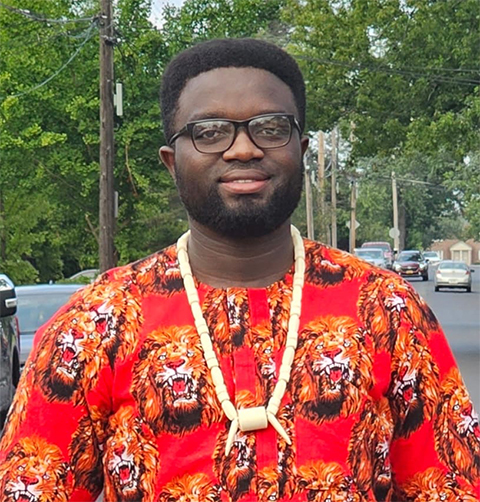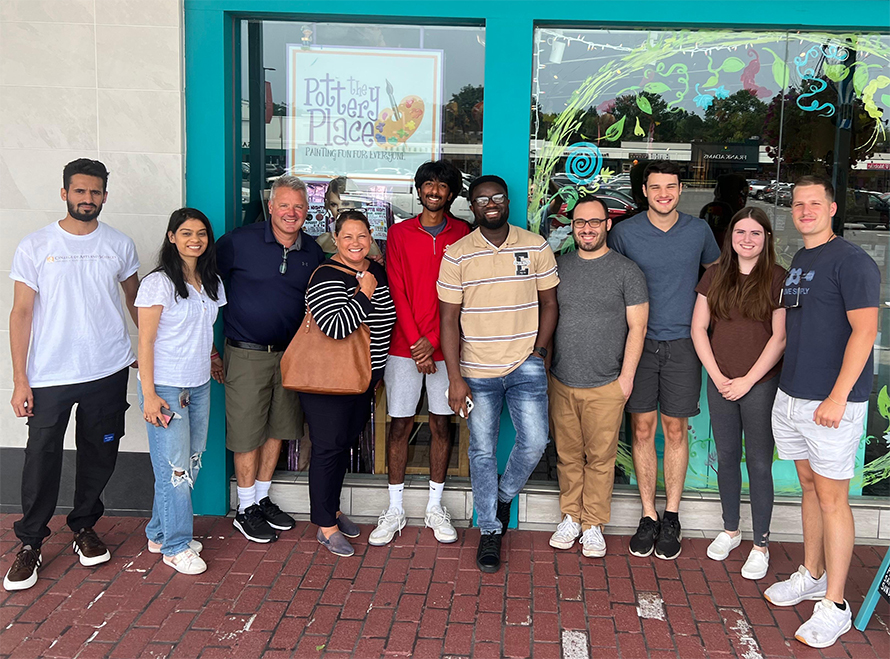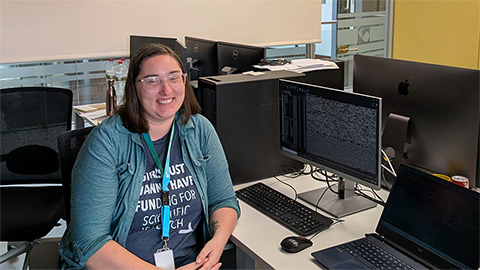
Shades of cultural difference
“Welcome to America.” This phrase filtered into my mind as our flight touched down at John F. Kennedy International Airport, New York. And then I thought, “I am in the United States of America.”
I was in the U.S. for my Ph.D. studies on a full-ride scholarship with a teaching assistant position at the University at Albany, State University of New York. I was excited and filled with a deep sense of gratitude.

My initial joy soon gave way to mixed feelings. I was perplexed by the cultural norms here; my greetings frequently went unacknowledged. In Nigeria, people are always willing to accept and return greetings, especially from a foreigner.
“Can’t they hear me?” I wondered, and, because this was during the COVID-19 pandemic, I asked myself, “Is my mask deadening my voice?”
Emmanuel, a Ghanian student I got linked up with through the UAlbany biology department’s Buddy Program, provided reassurance. “Humphrey, this is the U.S., not Nigeria,” he reminded me with a smile. “Not returning a greeting here doesn’t necessarily mean you weren’t heard. They must have responded by smiling, but you can’t see it because of the mask.”
For some weeks, Emma was my go-to whenever I needed something — until I was able to get a bank account and replace my incompatible Xiaomi phone.
Other aspects of American culture were completely foreign to me. We called our professors by their first names; in Nigeria, we mandatorily use title and last name. My principal investigator got me some welcome packages and drove me to get my COVID test. Later, I took a short trip to Chicago to visit some friends and family where I briefly reconnected and enjoyed some Nigerian meals.
When I began attending classes via Zoom, I was eager to see new faces, even though I had trouble recognizing these faces when we weren’t on Zoom because everyone was wearing masks. The first time I was able to identify a fellow in my cohort, I walked up to him and said, “Hi, you’re Rick, right? I am Humphrey.”
I wasn’t prepared for him to run up the next flight of steps and dart away after returning my greeting. I later learned that this was his modus operandiand not a personal slight.
Scholastically, things were awesome. I joined a lab and was surrounded by a great team. I was glad this was going to be my home for at least the next four years. We are from diverse backgrounds — Nigeria, India, Germany, Iran and the U.S. We celebrate each other’s birthday and embrace our rich diversity, from organizing lab potlucks, where we all bring our dishes from our native countries, to deciding on lunch restaurants that will appeal to everyone’s taste — we always joke about how Indians and Nigerians love spicy meals.
I learned to address my PI by his nickname. “Hi, Tom” I’d greet him each time we saw each other, and with a smile, he’d respond, “Hi, Humphrey.”
At first, I was uncomfortable with this, but with time, I became accustomed — mainly because he creates an environment of comfort and makes sure we are in our best states of mind and health. His motto is “work hard, play hard, and don’t forget to eat.”
The U.S. is not just my academic destination anymore; it’s where I learned to navigate and appreciate shades of cultural differences, translating my early culture shock into a journey of discovery and connection.

Enjoy reading ASBMB Today?
Become a member to receive the print edition four times a year and the digital edition monthly.
Learn moreGet the latest from ASBMB Today
Enter your email address, and we’ll send you a weekly email with recent articles, interviews and more.
Latest in Opinions
Opinions highlights or most popular articles

Women’s health cannot leave rare diseases behind
A physician living with lymphangioleiomyomatosis and a basic scientist explain why patient-driven, trial-ready research is essential to turning momentum into meaningful progress.

Making my spicy brain work for me
Researcher Reid Blanchett reflects on her journey navigating mental health struggles through graduate school. She found a new path in bioinformatics, proving that science can be flexible, forgiving and full of second chances.

The tortoise wins: How slowing down saved my Ph.D.
Graduate student Amy Bounds reflects on how slowing down in the lab not only improved her relationship with work but also made her a more productive scientist.

How pediatric cataracts shaped my scientific journey
Undergraduate student Grace Jones shares how she transformed her childhood cataract diagnosis into a scientific purpose. She explores how biochemistry can bring a clearer vision to others, and how personal history can shape discovery.

Debugging my code and teaching with ChatGPT
AI tools like ChatGPT have changed the way an assistant professor teaches and does research. But, he asserts that real growth still comes from struggle, and educators must help students use AI wisely — as scaffolds, not shortcuts.

AI in the lab: The power of smarter questions
An assistant professor discusses AI's evolution from a buzzword to a trusted research partner. It helps streamline reviews, troubleshoot code, save time and spark ideas, but its success relies on combining AI with expertise and critical thinking.

